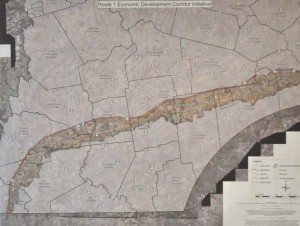Groups seek to work with local municipalities to spur commercial, light industrial development
By Mike McGann, Editor, The Times

The darkened area along US-1 will be the focus of an effort to facilitate commercial and light industrial development. Supporters argue such development will create local jobs and lower property taxes.
KENNETT — In an effort to spur local commercial and industrial growth, create local jobs and develop all-important tax ratable properties in the region, the Chester County Economic Development Partners Initiative (EDPI), unveiled their economic initiative for the US-1 corridor this week.
The group, working in concert with a number of local Chambers of Commerce as well as the Chester County Planing Commission, held the first of what will be a series of meetings in each of the towns along the corridor to explain their goal of creating resources and inventory for businesses that might be considering relocating to the region. It won’t be an overnight process — one that could take as long as two decades to fully reach fruition, but the process needs to start, organizers say.
“This is the best opportunity for economic development in the county,” said Bob Grabus, a development advisor for EDPI, speaking about the US-1 corridor, focusing specifically from Kennett Township south to the Maryland border. Neighboring Pennsbury is not seen as a likely option for light industrial/commercial development, he said, in part because of the number of residential units near the highway, although he allowed even there there might be a few pockets with options, but that local municipal governments would determine that.
His group, he said, was to provide information and act as a resource to both outside business as well as local communities looking to attract jobs and so-called ‘ratables‘ — commercial properties that pay local taxes but use less in the way of local services. The most such properties exist in a given area, the lower real estate taxes tend to be, he noted.
He allowed that a number of other largely rural towns would have no interest, which he emphasized is just fine.
“It’s not about us,” he said. “It’s about what the individual municipalities want.”
The plan would create an inventory of properties that each municipalities would like to see developed or redeveloped and work to match them with businesses looking to relocate in the very desirable southern Chester County location — almost dead in the middle between Atlanta and Boston on the eastern seaboard.
Another key advantage to working with municipalities further south along US-1, he noted — particularly in the area surrounding Kennett Square to Oxford — existing infrastructure, water, sewer and highways, often turns projects into redevelopment, reducing the amount of unspoiled land used for such projects.
He also cited the East Penn Railway as another advantage — in fact the entire focus of development is the land between US-1 and the rail line — suggesting that today’s freight use for the line could morph in the future to also include passenger traffic to increase options for workers to commute to and from jobs in the area.
What his group is hoping to avoid are future situations such as the ongoing litigation revolving around a proposed 970,000 square foot business park in New Garden on Newark Road. The proposal is currently in the courts, he said, after developers and the township could not work out traffic issues — some of which related to Pennsylvania Department of Transportation rules regarding the area — as well as other issues with storm water management, to get a conditional use approval.
While not taking sides in the ongoing dispute, Grabus said, the real problem is that the potential roadblocks weren’t identified early in the process before the developer was financially committed to the location. The result he said, is the loss of some $1.4 million in tax revenue to the Kennett Consolidated School District and hundreds of local jobs.
“And really it’s not just the taxes, it’s the jobs,” he said, identifying the worst fallout from the ongoing litigation, specifying that some 570 jobs would have been relocated from Delaware County or Newark, Del., local revenue added without a large addition of local government or school expense.
He suggested local municipalities could revise their planning and site development processes to highlight potential roadblocks earlier in the process — giving developers a better chance to cut their losses and move projects to a better suited location before spending large sums and many months of time before discovering their projects are untenable. He lauded Kennett for being among the few townships that do have such a process already.
Ultimately, the group, Grabus said, plans to create a Website for prospective developers looking to relocate, offering different criteria to help them find local “best match” options.







This is what politicians do. Instead of lowering corporate taxes for all, or rolling back out of control enviro laws, or repealing suffocating labor law, they carve-out exemptions for the politically connected. When I say “connected”, I mean a nice juicy campaign contribution will get you a nice juicy taxpayer funded “economic zone” with all the bonding needed to make it affordable for your enterprise to do business. These bonds bankrupt our state and place a burden on future generations to pay back.
Here’s a suggestion: Dear politicians, make ALL of Pennsylvania a good place to do business, not just in your bogus “economic zones” .
you have the option to not print my comment, but I won’t moderate it. It is not nasty, it is honest. (unfortunately, with some typos)
Jim
Jim, deep breath.
All comments — especially from new commentators — are subject to review, primarily to avoid spam, obscenities and personal attacks. It sometimes takes us a bit of time to get to them. We welcome divergent opinion.
How much of a 10 year tax break (Keystone Opportunity Zone) is the Economic Development Authority offering? Schools and some municipalities are hurting and these incentivdes are corporate welfare that often doesn not pay back long term as once the tax incentive ends, the company leaves.